高中英语语法分类练习题8 分词
- 格式:doc
- 大小:24.50 KB
- 文档页数:1
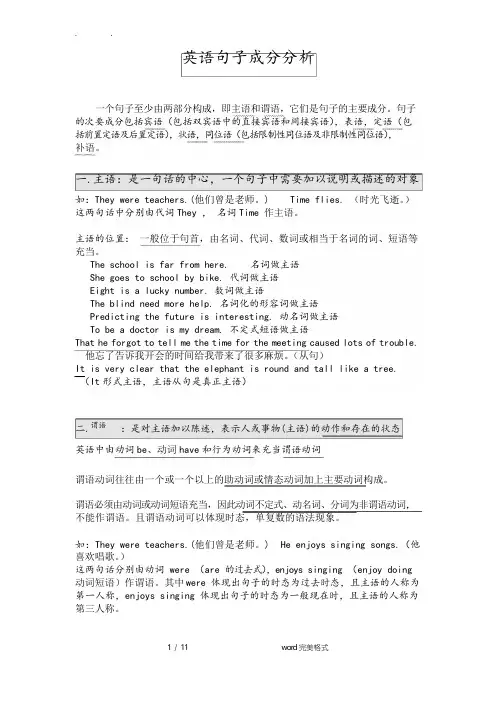
英语句子成分分析一个句子至少由两部分构成,即主语和谓语,它们是句子的主要成分。
句子的次要成分包括宾语(包括双宾语中的直接宾语和间接宾语),表语,定语(包括前置定语及后置定语),状语,同位语(包括限制性同位语及非限制性同位语),补语。
一.主语:是一句话的中心,一个句子中需要加以说明或描述的对象如:They were teachers.(他们曾是老师。
)Time flies.(时光飞逝。
)这两句话中分别由代词They,名词Time作主语。
主语的位置:一般位于句首,由名词、代词、数词或相当于名词的词、短语等充当。
The school is far from here.名词做主语She goes to school by bike.代词做主语Eight is a lucky number.数词做主语The blind need more help.名词化的形容词做主语Predicting the future is interesting.动名词做主语To be a doctor is my dream.不定式短语做主语That he forgot to tell me the time for the meeting caused lots of trouble.他忘了告诉我开会的时间给我带来了很多麻烦。
(从句)It is very clear that the elephant is round and tall like a tree.(It形式主语,主语从句是真正主语)二.谓语:是对主语加以陈述,表示人或事物(主语)的动作和存在的状态英语中由动词be、动词have和行为动词来充当谓语动词谓语动词往往由一个或一个以上的助动词或情态动词加上主要动词构成。
谓语必须由动词或动词短语充当,因此动词不定式、动名词、分词为非谓语动词,不能作谓语。
且谓语动词可以体现时态,单复数的语法现象。
如:They were teachers.(他们曾是老师。
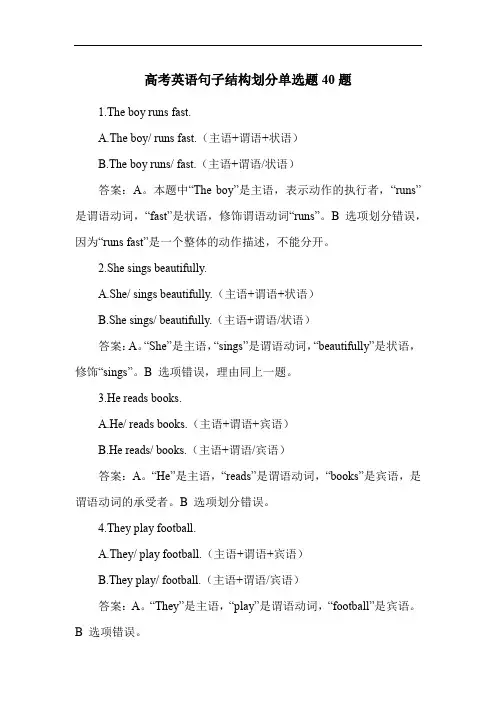
高考英语句子结构划分单选题40题1.The boy runs fast.A.The boy/ runs fast.(主语+谓语+状语)B.The boy runs/ fast.(主语+谓语/状语)答案:A。
本题中“The boy”是主语,表示动作的执行者,“runs”是谓语动词,“fast”是状语,修饰谓语动词“runs”。
B 选项划分错误,因为“runs fast”是一个整体的动作描述,不能分开。
2.She sings beautifully.A.She/ sings beautifully.(主语+谓语+状语)B.She sings/ beautifully.(主语+谓语/状语)答案:A。
“She”是主语,“sings”是谓语动词,“beautifully”是状语,修饰“sings”。
B 选项错误,理由同上一题。
3.He reads books.A.He/ reads books.(主语+谓语+宾语)B.He reads/ books.(主语+谓语/宾语)答案:A。
“He”是主语,“reads”是谓语动词,“books”是宾语,是谓语动词的承受者。
B 选项划分错误。
4.They play football.A.They/ play football.(主语+谓语+宾语)B.They play/ football.(主语+谓语/宾语)答案:A。
“They”是主语,“play”是谓语动词,“football”是宾语。
B 选项错误。
5.I write a letter.A.I/ write a letter.(主语+谓语+宾语)B.I write/ a letter.(主语+谓语/宾语)答案:A。
“I”是主语,“write”是谓语动词,“a letter”是宾语。
B 选项错误。
6.She eats an apple.A.She/ eats an apple.(主语+谓语+宾语)B.She eats/ an apple.(主语+谓语/宾语)答案:A。
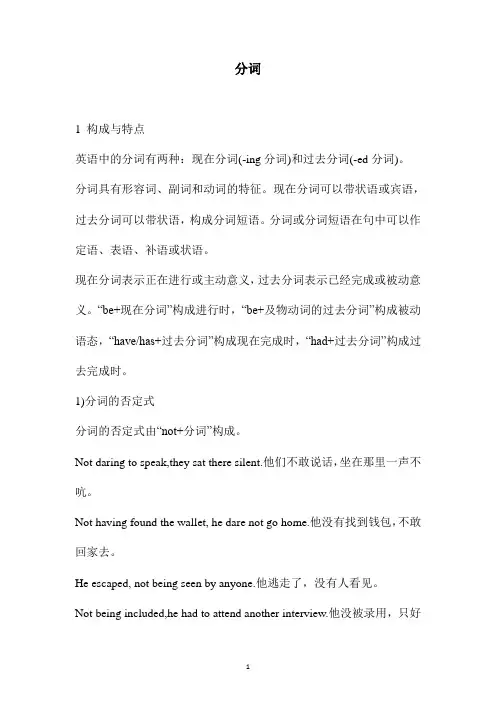
分词1 构成与特点英语中的分词有两种:现在分词(-ing分词)和过去分词(-ed分词)。
分词具有形容词、副词和动词的特征。
现在分词可以带状语或宾语,过去分词可以带状语,构成分词短语。
分词或分词短语在句中可以作定语、表语、补语或状语。
现在分词表示正在进行或主动意义,过去分词表示已经完成或被动意义。
“be+现在分词”构成进行时,“be+及物动词的过去分词”构成被动语态,“have/has+过去分词”构成现在完成时,“had+过去分词”构成过去完成时。
1)分词的否定式分词的否定式由“not+分词”构成。
Not daring to speak,they sat there silent.他们不敢说话,坐在那里一声不吭。
Not having found the wallet, he dare not go home.他没有找到钱包,不敢回家去。
He escaped, not being seen by anyone.他逃走了,没有人看见。
Not being included,he had to attend another interview.他没被录用,只好再参加另一个面试。
2)分词的一般式分词的一般式所表示的动作与谓语动词表示的动作同时发生或之后发生。
Walking along the road,he found a pen.在路上走着的时候,他发现了一支钢笔。
(同时)They sat there, listening to the radio. 他们坐在那里,收听广播。
(同时) She went home,finding the door locked.她回到家发现门锁着。
(=She went home and found the door locked.finding动作后发生)提示如果现在分词的动作发生在谓语动作之前,就不可用分词,而要用定语从句。
He is the boy hitting his head against the door.(误)He is the boy who hit his head against the door.(正)他就是那个头撞到门上的男孩。
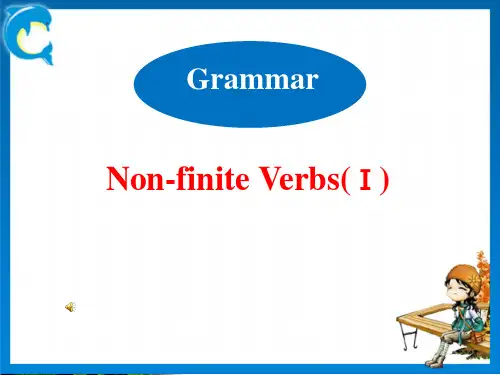
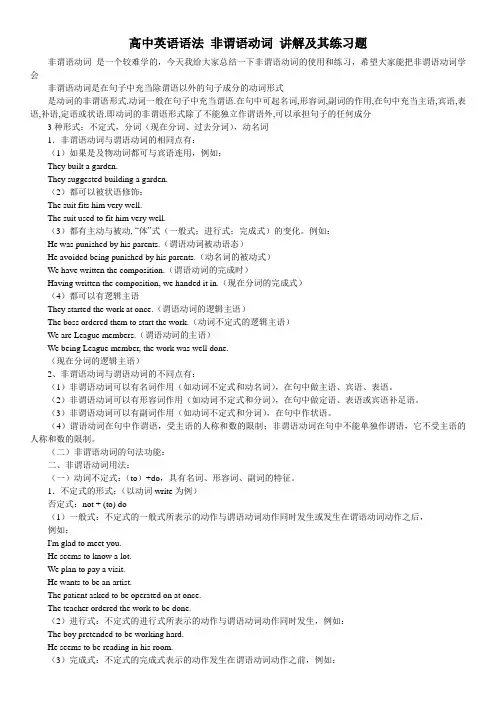
高中英语语法非谓语动词讲解及其练习题非谓语动词是一个较难学的,今天我给大家总结一下非谓语动词的使用和练习,希望大家能把非谓语动词学会非谓语动词是在句子中充当除谓语以外的句子成分的动词形式是动词的非谓语形式.动词一般在句子中充当谓语.在句中可起名词,形容词,副词的作用,在句中充当主语,宾语,表语,补语,定语或状语.即动词的非谓语形式除了不能独立作谓语外,可以承担句子的任何成分3种形式:不定式,分词(现在分词、过去分词),动名词1.非谓语动词与谓语动词的相同点有:(1)如果是及物动词都可与宾语连用,例如:They built a garden.They suggested building a garden.(2)都可以被状语修饰:The suit fits him very well.The suit used to fit him very well.(3)都有主动与被动, “体”式(一般式;进行式;完成式)的变化。
例如:He was punished by his parents.(谓语动词被动语态)He avoided being punished by his parents.(动名词的被动式)We have written the composition.(谓语动词的完成时)Having written the composition, we handed it in.(现在分词的完成式)(4)都可以有逻辑主语They started the work at once.(谓语动词的逻辑主语)The boss ordered them to start the work.(动词不定式的逻辑主语)We are League members.(谓语动词的主语)We being League member, the work was well done.(现在分词的逻辑主语)2、非谓语动词与谓语动词的不同点有:(1)非谓语动词可以有名词作用(如动词不定式和动名词),在句中做主语、宾语、表语。
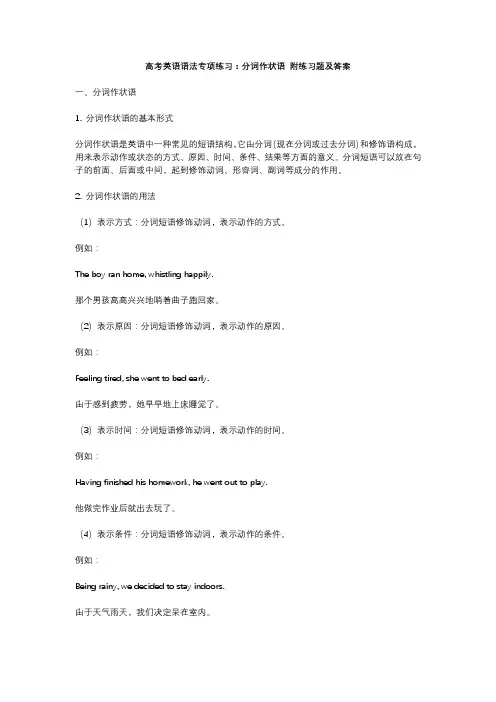
高考英语语法专项练习:分词作状语附练习题及答案一、分词作状语1. 分词作状语的基本形式分词作状语是英语中一种常见的短语结构,它由分词(现在分词或过去分词)和修饰语构成,用来表示动作或状态的方式、原因、时间、条件、结果等方面的意义。
分词短语可以放在句子的前面、后面或中间,起到修饰动词、形容词、副词等成分的作用。
2. 分词作状语的用法(1)表示方式:分词短语修饰动词,表示动作的方式。
例如:The boy ran home, whistling happily.那个男孩高高兴兴地哨着曲子跑回家。
(2)表示原因:分词短语修饰动词,表示动作的原因。
例如:Feeling tired, she went to bed early.由于感到疲劳,她早早地上床睡觉了。
(3)表示时间:分词短语修饰动词,表示动作的时间。
例如:Having finished his homework, he went out to play.他做完作业后就出去玩了。
(4)表示条件:分词短语修饰动词,表示动作的条件。
例如:Being rainy, we decided to stay indoors.由于天气雨天,我们决定呆在室内。
(5)表示结果:分词短语修饰动词,表示动作的结果。
例如:The boy fell off his bike, hurting his knee.那个男孩从自行车上摔下来,伤了膝盖。
3. 分词作状语的构成(1)现在分词作状语通常用来表示动作进行的方式、原因、时间、条件等,常常放在谓语动词之后,或者放在句首,用逗号与句子分开。
例如:He walked down the street, whistling a tune.他哼着曲子沿街走去。
Whistling a tune, he walked down the street.哼着曲子,他沿街走去。
(2)过去分词作状语通常用来表示动作已经完成或者被完成的情况,常常放在谓语动词之后,或者放在句首,用逗号与句子分开。
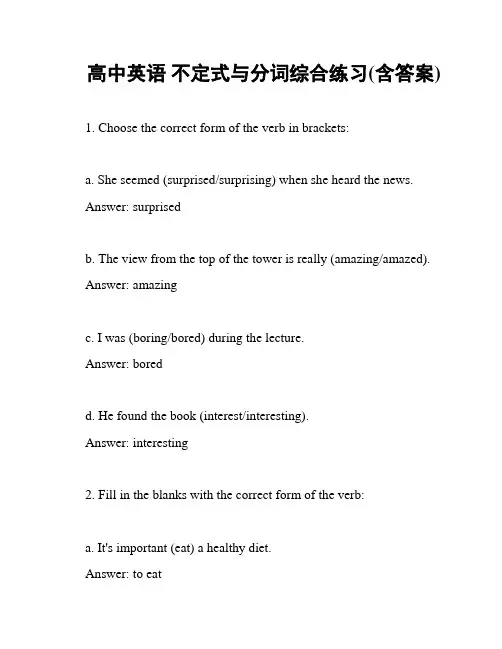
高中英语不定式与分词综合练习(含答案)1. Choose the correct form of the verb in brackets:a. She seemed (surprised/surprising) when she heard the news. Answer: surprisedb. The view from the top of the tower is really (amazing/amazed). Answer: amazingc. I was (boring/bored) during the lecture.Answer: boredd. He found the book (interest/interesting).Answer: interesting2. Fill in the blanks with the correct form of the verb:a. It's important (eat) a healthy diet.Answer: to eatb. She pretended (not know) the answer.Answer: not to knowc. I don't feel like (go) for a walk today.Answer: goingAnswer: Visitinga. She had a lot of work. She didn't go out.Answer: Having a lot of work, she didn't go out.b. They missed the train. They had to wait for two hours. Answer: Having missed the train, they had to wait for two hours.c. He failed the exam. He didn't study hard.Answer: Failing the exam, he didn't study hard.d. She lost her keys. She couldn't open the door.Answer: Having lost her keys, she couldn't open the door.4. Rewrite the sentences using non-finite verbs:a. She was too tired to walk home.Answer: She was too tired that she couldn't walk home.b. They are too young to watch this movie.Answer: They are so young that they can't watch this movie.c. I'm glad I didn't miss the bus.Answer: I'm glad that I caught the bus.d. He was the first one to finish the test.Answer: He finished the test before anyone else.以上练习为不定式与分词的语法综合练习,希望可以对学生们的英语学习有所帮助。
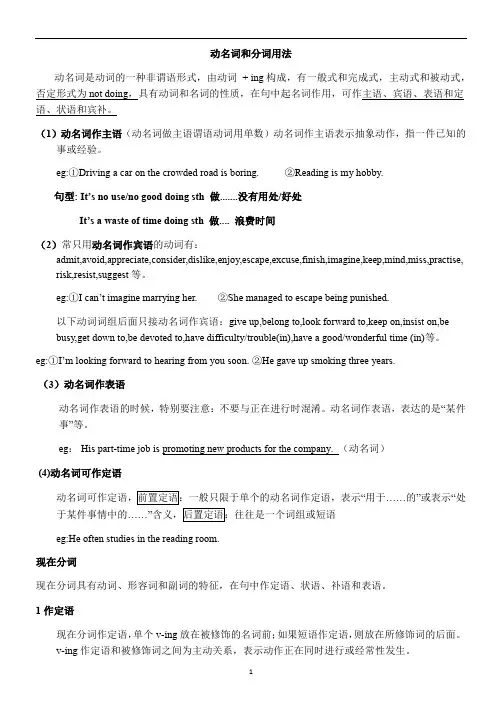
动名词和分词用法动名词是动词的一种非谓语形式,由动词+ ing构成,有一般式和完成式,主动式和被动式,否定形式为not doing,具有动词和名词的性质,在句中起名词作用,可作主语、宾语、表语和定语、状语和宾补。
(1)动名词作主语(动名词做主语谓语动词用单数)动名词作主语表示抽象动作,指一件已知的事或经验。
eg:①Driving a car on the crowded road is boring. ②Reading is my hobby.句型: It’s no use/no good doing sth 做.......没有用处/好处It’s a waste of time doing sth 做.... 浪费时间(2)常只用动名词作宾语的动词有:admit,avoid,appreciate,consider,dislike,enjoy,escape,excuse,finish,imagine,keep,mind,miss,practise, risk,resist,suggest等。
eg:①I can’t imagine marrying her. ②She managed to escape being punished.以下动词词组后面只接动名词作宾语:give up,belong to,look forward to,keep on,insist on,be busy,get down to,be devoted to,have difficulty/trouble(in),have a good/wonderful time (in)等。
eg:①I’m looking forward to hearing from you soon. ②He gave up smoking three years.(3)动名词作表语动名词作表语的时候,特别要注意:不要与正在进行时混淆。
动名词作表语,表达的是“某件事”等。
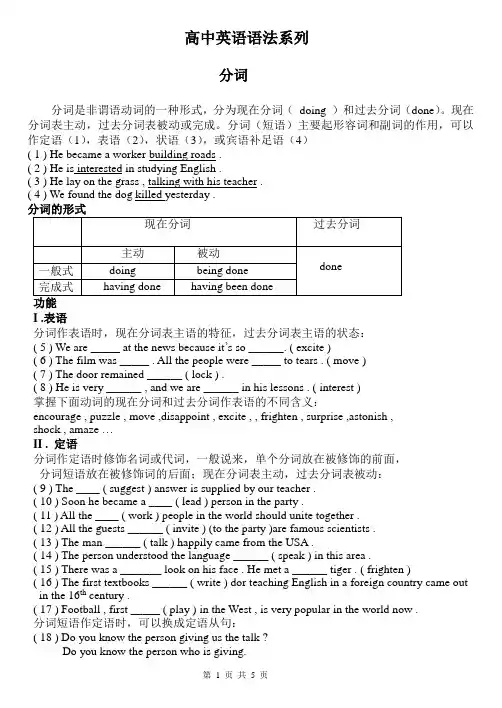
高中英语语法系列分词分词是非谓语动词的一种形式,分为现在分词(doing )和过去分词(done)。
现在分词表主动,过去分词表被动或完成。
分词(短语)主要起形容词和副词的作用,可以作定语(1),表语(2),状语(3),或宾语补足语(4)( 1 ) He became a worker building roads .( 2 ) He is interested in studying English .( 3 ) He lay on the grass , talking with his teacher .( 4 ) We found the dog killed yesterday .I .表语分词作表语时,现在分词表主语的特征,过去分词表主语的状态:( 5 ) We are _____ at the news because it’s so ______. ( excite )( 6 ) The film was _____ . All the people were _____ to tears . ( move )( 7 ) The door remained ______ ( lock ) .( 8 ) He is very ______ , and we are ______ in his lessons . ( interest )掌握下面动词的现在分词和过去分词作表语的不同含义:encourage , puzzle , move ,disappoint , excite , , frighten , surprise ,astonish ,shock , amaze …II . 定语分词作定语时修饰名词或代词,一般说来,单个分词放在被修饰的前面,分词短语放在被修饰词的后面;现在分词表主动,过去分词表被动:( 9 ) The ____ ( suggest ) answer is supplied by our teacher .( 10 ) Soon he became a ____ ( lead ) person in the party .( 11 ) All the ____ ( work ) people in the world should unite together .( 12 ) All the guests ______ ( invite ) (to the party )are famous scientists .( 13 ) The man ______ ( talk ) happily came from the USA .( 14 ) The person understood the language ______ ( speak ) in this area .( 15 ) There was a _______ look on his face . He met a ______ tiger . ( frighten )( 16 ) The first textbooks ______ ( write ) dor teaching English in a foreign country came out in the 16th century .( 17 ) Football , first _____ ( play ) in the West , is very popular in the world now .分词短语作定语时,可以换成定语从句:( 18 ) Do you know the person giving us the talk ?Do you know the person who is giving.( 19 ) China is a country belonging to the Third World ( = which belongs to …) .III . 宾语补足语分词可以在see , hear , notice , find , watch , keep , get , have , feel , leave …等动词后的宾语作宾补,现在分词表主动,过去分词表被动:( 20 ) Do you see a girl _____ ( run ) towards us ?( 21 ) Suddenly he heard someone _____ ( knock ) gently on the window .( 22 ) He had us _______ ( laugh ) all the way .( 23 ) I am sorry to have kept you ______ ( wait ) so long .( 24 ) She was glad to find his son well ____ ( take ) care of in the school .( 25 ) We found him _____ ( lie ) under a big tree .( 26 ) Don’t leave the window ____ ( shut ) all the time .( 27 ) I will have my teeth _____ ( examine ) in the hospital .( 28 ) I can feel my heart _____ ( beat ) fast .( 29 ) I should like your homework ____ ( hand ) in at once .( 30 ) He once heard the song _____ ( sing ) in German .( 31 ) She can’t make herself _______ ( understand ) when she speaks English .在see , hear , watch , notice , feel …等动词后也可以用动词不定式作宾补,同现在分词的区分:现在分词表动作正在发生,不定式表动作已结束。
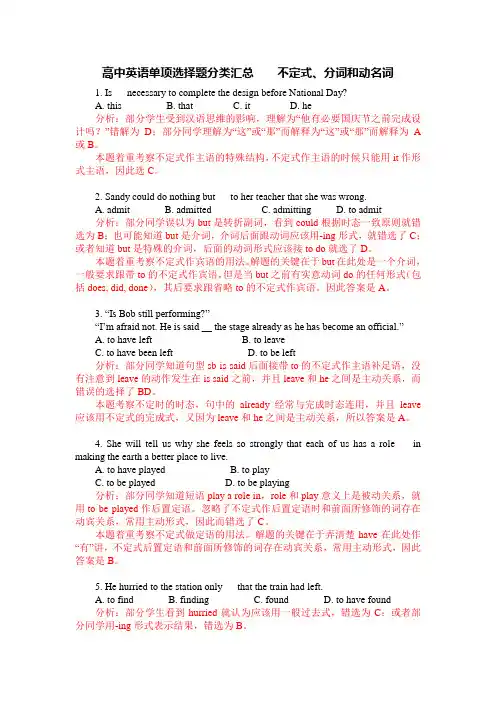
高中英语单项选择题分类汇总不定式、分词和动名词1. Is __ necessary to complete the design before National Day?A. thisB. thatC. itD. he分析:部分学生受到汉语思维的影响,理解为“他有必要国庆节之前完成设计吗?”错解为D;部分同学理解为“这”或“那”而解释为“这”或“那”而解释为A 或B。
本题着重考察不定式作主语的特殊结构,不定式作主语的时候只能用it作形式主语,因此选C。
2. Sandy could do nothing but __ to her teacher that she was wrong.A. admitB. admittedC. admittingD. to admit分析:部分同学误以为but是转折副词,看到could根据时态一致原则就错选为B;也可能知道but是介词,介词后面跟动词应该用-ing形式,就错选了C;或者知道but是特殊的介词,后面的动词形式应该接to do就选了D。
本题着重考察不定式作宾语的用法。
解题的关键在于but在此处是一个介词,一般要求跟带to的不定式作宾语,但是当but之前有实意动词do的任何形式(包括does, did, done),其后要求跟省略to的不定式作宾语。
因此答案是A。
3. “Is Bob still performing?”“I’m afraid not. He is said __ the stage already as he has become an official.”A. to have leftB. to leaveC. to have been leftD. to be left分析:部分同学知道句型sb is said后面接带to的不定式作主语补足语,没有注意到leave的动作发生在is said之前,并且leave和he之间是主动关系,而错误的选择了BD。
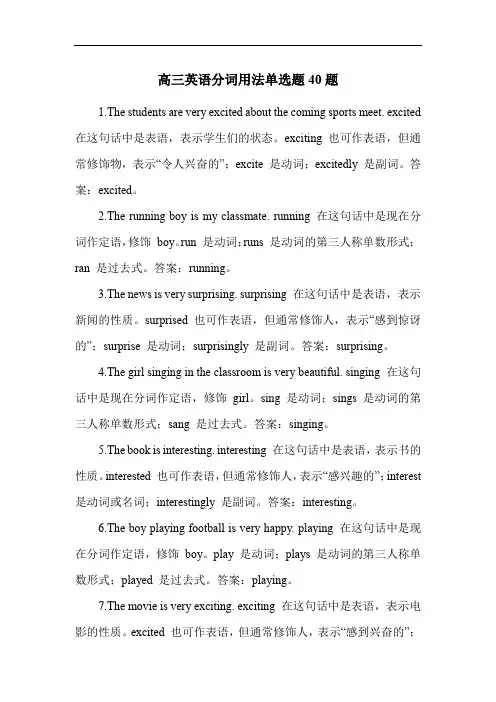
高三英语分词用法单选题40题1.The students are very excited about the coming sports meet. excited 在这句话中是表语,表示学生们的状态。
exciting 也可作表语,但通常修饰物,表示“令人兴奋的”;excite 是动词;excitedly 是副词。
答案:excited。
2.The running boy is my classmate. running 在这句话中是现在分词作定语,修饰boy。
run 是动词;runs 是动词的第三人称单数形式;ran 是过去式。
答案:running。
3.The news is very surprising. surprising 在这句话中是表语,表示新闻的性质。
surprised 也可作表语,但通常修饰人,表示“感到惊讶的”;surprise 是动词;surprisingly 是副词。
答案:surprising。
4.The girl singing in the classroom is very beautiful. singing 在这句话中是现在分词作定语,修饰girl。
sing 是动词;sings 是动词的第三人称单数形式;sang 是过去式。
答案:singing。
5.The book is interesting. interesting 在这句话中是表语,表示书的性质。
interested 也可作表语,但通常修饰人,表示“感兴趣的”;interest 是动词或名词;interestingly 是副词。
答案:interesting。
6.The boy playing football is very happy. playing 在这句话中是现在分词作定语,修饰boy。
play 是动词;plays 是动词的第三人称单数形式;played 是过去式。
答案:playing。
7.The movie is very exciting. exciting 在这句话中是表语,表示电影的性质。
高中英语语法综合练习50题1. I ______ (read) this book twice.答案:have read解析:“twice”表示动作已经完成,用现在完成时,结构为“have/has + 过去分词”,主语是I,所以用have read。
2. She ______ (write) a letter to her friend last night.答案:wrote解析:“last night”是过去的时间点,所以用一般过去时,write 的过去式是wrote。
3. We ______ (wait) for him for two hours, but he hasn't come yet.答案:have waited解析:“for two hours”表示时间段,且“but he hasn't come yet”说明动作还在持续,用现在完成进行时,结构为“have/has been + 现在分词”,主语是we,所以用have waited。
4. By the time he arrives, we ______ (finish) the work.答案:will have finished解析:“By the time he arrives”表示将来的某个时间点,“finish”这个动作在那个时间点之前会完成,用将来完成时,结构为“will have + 过去分词”,所以用will have finished。
5. Tom ______ (play) football when I saw him yesterday.答案:was playing解析:“when I saw him yesterday”表示过去某个具体的时间点,在那个时间点正在进行的动作,用过去进行时,结构为“was/were + 现在分词”,主语是Tom,所以用was playing。
6. We were all very worried over the fact ______ you were ill.A. thatB. whichC. whatD. about which答案:A解析:that 引导同位语从句,解释说明fact 的具体内容。
高二英分词专项练习班级姓名用所给词的正确形式填空。
1.The gentleman (stand) over there is our principal.2.I found him (lie) on the grass.3.(hear) the news, he began to cry.4.(turn) to the left, you will find the farm.5.He entered the room, (follow)his father.6.His parents died in the accident, (leave)him an orphan.7.The new school (build) now is ours.8.(walk) down the street, I ran into Lily.9.(pass) my driving test, I was able to buy my first car.10.The concert (give)by the symphony orchestra was a great success.11.(see) from the hill, the city looks magnificent.12.I received a letter (write) in English.13.I felt (exhaust) this morning.14.I had my bike (repair) yesterday.15.They went back home at last, tired but (excite).16.China is a (develop)country and America is a (develop)country.17.Her (puzzle)expression on her face showed that she didn’t know the answer.18.Generally (speak), women live longer than men.19.(judge) from what you say,he ought to succeed.20.Time (permit), we will go to visit the Great Wall.21.___________(compare) with the old one, the new building looks more beautiful.22.People in the south have their houses ______(make) of bamboo.23.With the problem___________ (solve),the meeting came to an end.24.. Returning home,the woman found all the windows ___________ (break).25.______ (dress) in a white uniform, he looks more like a cook than a doctor.26.He spoke loudly to make himself (hear).27.(warn) of typhoon, the fishmen sailed for the nearest harbor.28. A person, when (challenge), can often do what is normally beyond his ability.29.Mrs.White showed her students some old maps (borrow) from the library.30.(absorb) in the book, he didn't notice me enter the room.31.With all my homework (finish), I went home.32.The questions (raise) by the scientist are very important.33.The ground is covered with (fall) leaves.34.Tsinghua University, (found) in 1911, is home to a great number of outstanding figures.35. (see) from the top of the tower, we can see the whole city.参考答案1.standing2.lying3.Hearing4.Turning5.following6.leaving7.being built8.Walking9.Having passed10.g iven11.S een12.w ritten13.e xhausted14.r epaired15.e xcited16.d eveloping; developed17.p uzzled18.s peaking19.J udging20.p ermitting21.C ompared22.m ade23.s olved24.b roken25.D ressed26.h eard27.H aving been warned28.c hallenged29.b orrowed30.A bsorbed31.f inished32.r aised33.f allen34.f ounded35.S eeing。
高考英语语法词汇专项突破:过去分词作状语及短语动词考点扫描+巩固练习养成良好的答题习惯,是决定高考英语成败的决定性因素之一。
做题前,要认真阅读题目要求、题干和选项,并对答案内容作出合理预测;答题时,切忌跟着感觉走,最好按照题目序号来做,不会的或存在疑问的,要做好标记,要善于发现,找到题目的题眼所在,规范答题,书写工整;答题完毕时,要认真检查,查漏补缺,纠正错误。
【考题展示】【考例】(2018·北京)Ordinary soap, _________(use) correctly, can deal with bacteria effectively.答案与解析:used。
考查非谓语动词之过去分词作状语。
Ordinary soap can deal with bacterial effectively 是主句,_________ correctly是条件状语,修饰ordinary soap,ordinary soap和use之间是被动关系,故要用过去分词作状语。
句意:如果正确使用的话,普通的肥皂可以有效地处理细菌。
【重难点解读】过去分词作状语及短语动词一直是历年高考试题的重要测试点,测试要点涉及到句式、语态、搭配、省略等,现将其主要考点总结如下:一、过去分词作状语过去分词或过去分词短语作状语时,表示被动和完成,在句子中一般可以作时间、原因、条件、让步、结果状语等,通常要求其逻辑主语与句子主语保持一致。
1. 过去分词或过去分词短语单独作状语【考例】____ in the poorest area of Glasgow, he had a long, hard road to becoming a football star. (XXXX·重庆卷)A. Being raisedB. RaisingC. RaisedD. To raise【答案与解析】C。
动词raise与句子主语he是动宾关系,即“被抚养大”,过去分词短语作原因状语,相当于Because he was raised in… 。
高二英语分词练习题1. Having finished my homework, I went for a walk in the park.2. The broken chair needs to be repaired.3. The children, excited about their trip, packed their bags eagerly.4. She found him sitting on the couch, reading a book.5. Running along the beach, the dog chased after the frisbee.6. The car, driven by my father, is very fast.7. The teacher was pleased with the students' hard work, resulting in excellent grades.8. Frightened by the loud noise, the cat ran away and hid under the bed.9. The cake, baked by my grandmother, smelled delicious.10. Exhausted from the long day, I fell asleep as soon as I got into bed.11. The movie, directed by Steven Spielberg, won numerous awards.12. The glass, filled with water, slipped from her hand and shattered on the floor.13. The boy, fascinated by magic tricks, watched the magician's performance with great interest.14. The students, studying diligently for the exam, were well-prepared.15. The tired hiker sat down on a rock, admiring the breathtaking view.16. Excited about the upcoming concert, she bought tickets for her favorite band.17. The injured bird, unable to fly, hopped along the ground.18. The noise, coming from the next room, disturbed my concentration.19. Having completed the project, they celebrated their success with a party.20. The children, dressed in costumes, enjoyed trick-or-treating on Halloween night.21. The letter, written by the CEO, outlined the company's future plans.22. Worried about her safety, he called her repeatedly until she answered.23. The cake, decorated with colorful icing, looked too beautiful to eat.24. The flowers, watered regularly, bloomed beautifully in the garden.25. The loud music playing in the background made it difficult to concentrate.26. Frustrated by the constant delays, the passengers demanded an explanation from the airline staff.27. Startled by a sudden noise, the cat jumped off the couch and hid under the table.28. The students, excited about the field trip, boarded the bus with enthusiasm.29. The dog, wagging its tail, greeted its owner at the door.30. The runner, exhausted from the race, collapsed onto the ground.31. The painting, created by a famous artist, was sold for a million dollars.32. The keys, lost in the park, were never found again.33. The baby, crying loudly, kept the entire household awake.34. The cake, baked by the chef, tasted absolutely delicious.35. The broken window, caused by a stray baseball, was quickly repaired by the homeowner.36. The driver, distracted by a phone call, didn't notice the red light and caused an accident.37. The flowers, watered daily, grew taller and healthier.38. The child, fascinated by the fireworks, clapped and cheered with delight.39. The missing backpack, left on the bus, contained important documents.40. With the match cancelled due to rain, the disappointed fans went home.以上是一些适用于高二英语分词练习题的例子。
分词一、知识框架二、知识梳理分词是一种非谓语动词形式。
分词有现在分词和过去分词两种。
分词既具有动词的一些特征,可自状语,有自己的逻辑主语,现在分词还可以带宾语,有时态和语态的变化。
它同时又具有形容词和副词的句法功能,可以作表语、定语、状语,也可以用于复合结构作宾语补足语等。
(一)现在分词和过去分词的区别在语态上,现在分词表示主动意义,过去分词表示被动意义;在时间上,现在分词表示的动作往往正在进行或者与谓语动词同时发生,过去分词表示的动作已经完成或没有一定的时间性。
如:falling leaves 正在下落的树叶fallen leaves 已经落在地上的树叶(二)分词的句法功能一)作表语arrived, returned, passed, changed, faded等,这些主要是表示运动及转变的不及物动词,它们用作表语时带有书面语色彩,而且使用范围很窄。
例如:Summer is gone. 夏天过去了。
Autumn is come. 秋天到了。
The leaves are fallen.树叶落了。
The sun is risen.太阳升起来了。
分词可以在感官动词和使役动词等后与一个名词(代词)构成复合宾语。
若表动作进行,分词与宾语之间是逻辑上的主谓关系,用现在分词;若表动作完成,分词与宾语之间是逻辑上的动宾关系,用过去分词。
常用于以下结构:1)感官动词:see/ look at/ watch/ notice/ observe/ witness/ hear/ listen to/ smell/ feel + sb/sth + doing/doneI saw a book lying thereA book was seen lying there.He found his hometown greatly changed after many years.2)表发现、致使:find/ discover/ catch/ get/ have/ leave/ keep /send/ set/ start + sb/sth + doingA flood hit the area the other day, leaving few houses standing.I am sorry to have kept you waiting for so long.The girl who was caught cheating has admitted her mistake.A sudden rain sent the players and the audience running in all directions for cover.After repairing it, the mechanic managed to start the machine running again.3)表心理、致使:consider/ have/ get/ keep/ leave/ make + sb/sth + doneIt is time that you had your washing machine repaired.I will try my best to get my English improved.I considered this problem settled.4)表要求、希望、命令:declare/ like/ need/ order/ want/ wish + sb/sth + doneHe declared the 2008 Beijing Olympic Games closed.I don’t want any of you (to be) involved in the scandal.Do you wish your breakfast (to be) brought to your room?5)with/without + sb/sth + doing/doneWith the fellow leading the way, we had no trouble finding the temple.With her skirt caught on a nail, she couldn’t move.Without anyone noticing, he slipped through the window.They had passed without a singled word spoken.1)单个分词作定语,分词前置。
练习8 分词
() 1. __________ with the best students, I still have a long way to go.
A. Having compared
B. To compare
C. Compared
D. Compare
() 2. The music of the film _________ by him sounds so ___________ .
A. playing, exciting
B. played, excited
C. playing, excited
D. played, exciting
() 3. __________ against the coming hurricane, they dared not leave home.
A. Warned
B. Having warned
C. To warn
D. Warn
() 4. In __________ countries, you can’t always make yourself _______ by speaking English.
A. English-speaking, understand
B. English-spoken, understand
C. English-speaking, understood
D. English-speaking, understood ()5. After _____________ the old man, the doctor suggested that he ___________ a bad cold.
A. examining, should catch
B. examined, had caught
C. examining, had caught
D. examined, catch
() 6. _____________ , Tom jumped into the river and had a good time in it.
A. Be a good swimmer
B. Being a good swimmer
C. Having been good swimmer
D. To be a good swimmer
()7. ________ how to read the new words, I often look them up in the dictionary.
A. Having not known
B. Not to know
C. Don’t know
D. Not knowing
()8. As his parent, you shouldn’t have your child ___________ such a book.
A. read
B. to read
C. reading
D. be reading
()9. He returned from abroad ______________ that his mother had been badly ill.
A. heard
B. having been heard
C. having phoned
D. having been phoned。